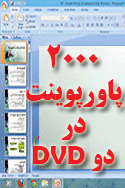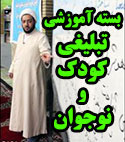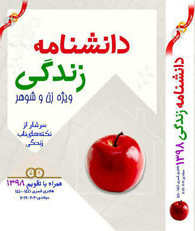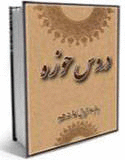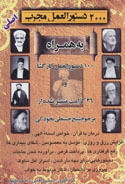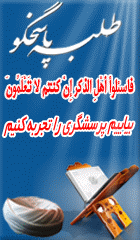Dua: Guidance from the Qur’an, the Hadith, and the Imams (A.S.)
Objectives:
Dua is an important part of our faith and belief. It is a higher form of worship that Allah loves. It is a means of keeping in touch with the Creator, and draws the supplicant closer to the Almighty. It causes increase in bounties and helps remove pain and suffering. There are many ways that people make Dua. This article presents information from the Qur’an, the Hadiths of the prophet, and from the teachings and Duas of the infallible Imams. It is hoped that the reader will find the material helpful in communicating with the Lord, the Exalted, most High.
What is Dua?
Literally the word Dua means “to call upon.” In Islam Dua or supplication means to address Allah (SWT) with praise, thanksgiving, hope, and to mention one’s needs. In English it is also referred to as “Prayer.”
Importance of making Dua.
In Islam Dua has a very special place. Allah (SWT) has commanded in Quran that we make Dua to Him. Those who are too proud to make Dua, Allah (SWT) says will be punished. It has been related from the sources of the Imams that Dua can change fate. One should not say “this can not happen.” Nothing is beyond the reach and the power of Allah (SWT). He is most generous and full of mercy.
Types of Dua:
Dua in one’s own words, depending upon need or situation. It may be very spontaneous or may be well thought over. It may be based upon verses of Qur’an. Quran has many Duas. Some Dua formulas are from Allah (SWT) to mankind addressed directly, and others are the Duas taught to the prophets of the old. It may have come to us from the Prophet Muhammad (S.A.W.) & his progeny or from the Imams.
Psychological and spiritual benefits of making Dua.
There are several consequences:
a) It increases the faith of the supplicant, who acknowledges the fact that Allah (SWT) is Omnipotent, Omnipresent and is the ultimate recourse.
b) It gives hope and the strength to the distressed soul, and saves from despair.
c) It brings the supplicant closer to the Creator, strengthening the bond between them.
d) It increases humility, which in turn increases piety.
e) It curbs ego and vanity.
Etiquette for making Dua.
Just like when we speak to a dignitary, or head of a state, we use certain language; follow the protocol to get proper attention and response. Similarly there are formulas and language taught by the Quran, the Prophet (S.A.W.) and his progeny, and the Imams to make Dua.
Guidance from the Qur’an:
Allah (SWT) says in the Qur’an:
“Thee alone we worship and Thee alone we ask for help.” S.1
“And your Lord says: Call on Me; I will answer your (prayer). But those who are too arrogant to serve Me will surely find themselves in Hell-in humiliation.” S 40: 60
“Say; O My servants who have transgressed against their souls; despair not of the Mercy of Allah: For Allah forgives all sins; for He is oft Forgiving, most Merciful.” S39: 53
Say: “Call upon Allah, or call upon Rahman: By whatever name you call upon Him, (it is well): For to Him belong the Most Beautiful Names. S.17: 110
“And when My servants ask Thee (O’ Prophet) about Me, then verily I am near, I answer the prayer (Dua) of the supplicant when he beseeches unto Me. So let them hear My call, and believe in Me, so that they may be led aright.” S. 2: 186
Call on your Lord with humility and in private; for Allah loves not those who trespass beyond bounds
“And those whom you call upon other than Him are not able to help you, nor can they help themselves.”
S 7:197
Say: “Call on those, besides Him, whom you fancy. They have neither the power to remove your troubles nor to change them. Those whom they call upon (besides Allah) desire (themselves) means of access to their Lord; Even those who are nearest: ….” S 17: 56, 57
“Call you not (any one) besides Allah, that neither profits you nor harms you…” S 10: 106
“For Him (alone) is prayer in truth: Any others that they call upon besides Him hear them no more than if they were to stretch forth their hands for water to reach their mouths, but it reaches them not: ….” S. 13: 14
Guidance from Hadith and Sunnah of the Prophet (S.A.W.) and his progeny.
• Supplication is the essence of worship. (Tirmidhi)
• When one of you supplicates, he should not say, ”O' Allah, forgive me if You will,” but be firm in asking and make the desire great, for what Allah gives is nothing great for Him. (Muslim)
• Each of you should ask your Lord for all your needs; You should even ask Him for “the thong of the Sandal” when it breaks.
The Hadith that have come through the sources of Imams:
Reported by William Chittick in the introduction to Sahifa-e-Sajjadia.
• It has been reported that the prophet (S.A.W.) related that Allah (SWT) says: “O My servants, all of you are misguided except him whom I guide, so ask Me for guidance, and I will guide you. All of you are poor except whom I enrich, so ask Me for riches, and I will provide for you. All of you are sinners except him whom I release, so ask Me to forgive you, and I will forgive you.”
• The prophet (S.A.W.) and his progeny said: “Supplication is the weapon of the man of faith, the centre-pole (essence) of the religion, and the light of the heavens and the earth.”
Guidance from the Imams:
Hadrath Ali (A.S.)
Nahjul-Balagha: Excerpts from Hadrath Ali’s advice to his son Hasan (A.S.) in the form of Will: (Letter No. 31 in Nahjul Balagha): “Trust in Allah and let your mind seek His protection in every calamity and suffering; because you will thus entrust yourself and your affairs to the Best Trustee and the Mightiest Guardian. Do not seek help and protection of any body but Allah. Reserve your prayers, your requests, your solicitations, your supplications and your entreaties to Him and Him alone. “Therefore the best thing for you to do is to seek guidance of the one who has created you, Who maintains and nourishes you, Who has given you a balanced mind and normally working body. Your prayers should be reserved for Him only, your requests and solicitations should be to Him alone. You should be afraid of Him and no body else. You beg of Him to grant you your heart’s desires; you lay before him the secrets of your heart; you tell him about all the calamities that have befallen you and misfortunes that face you, and beseech His help to overcome them. Think over it that by simply granting you the privilege of praying for His favors and Mercies, He has handed over the keys of His Treasures to you. Whenever you are in need, you pray and He confers His favors and Blessings.”
Dua-e Kumayl:
Here Hadrath Ali teaches us how to beseech Allah (SWT). Excerpts are given below:
“Oh Allah, I ask Thee by Thy mercy …” “I seek intercession from Thee with Thyself …. “My Allah and my Lord! Have I any but Thee from whom to ask for removal of my affliction and regard for my affairs?”
“And towards Thee my Lord, I have extended my hand…” “Bless Muhammad and Muhammad’s household, and do with me what is worthy of Thee!”
“My Allah, do You see that I have come to You from the direction of hopes …” “I have knocked upon the door of Your mercy with hand of my hope.” “O the best of those who is called to remove affliction and object of hope in every difficulty and ease!" “Bless Muhammad and his household, the God-fearing, answer my supplication, hear my call…” “By Thy Mercy, O most Merciful of the Merciful! And Allah bless the best of His creatures, Muhammad and his household.”
Dua Al Mashlool:
“Oh He Who answers all supplications! Oh He Who bestows requests! Oh He Who fulfills all entreaties! Oh He Who provides all needs!” “I ask Thee with every asking … “I ask Thee with every name with which Thou has named Thyself …” “And I ask Thee by the Names most beautiful that Thou hast described in Thy Book, …” “And I ask Thee my God, I call Thee my Lord, I have hope in Thee my Master, …” “For I have called Thee just as Thou has commanded me.”
Duas of Imam Zainul Abedin AS. (Sahifa-e-Sajjadia):
This Imam is most notable for his beautiful worded supplications, which were collected by his disciple in his very presence and are available in book form titled “Sahifa-e-Sajjadia, also known as Sahifa-e-Kamilah.”
In his Dua for Wednesday the Imam (A.S.) says:
“Therefore bless Muhammad, the last prophet, and the members of his house, the pure, the holy, and let me have the intercession of Muhammad, (may thy favor be on him and his progeny), and do not deprive me of his company; verily, verily Thou art the most Merciful.”
In the “Thursday Dua” the Imam prays:
“O Lord! Bless Muhammad and his Aal (progeny), and let my adherence to him be an effectual intercession on the Day of judgment. Verily Thou art the most Merciful.”
In “Dua Makarim al Akhlaq” the Imam (A.S.) prays:
O Allah, make me leap to Thee in times of distress, ask from Thee in needs, and plead to Thee in misery! Tempt me not to seek help from other than Thee when I am distressed, to humble myself in asking from someone else when I am poor, or to plead with someone less than Thee when I fear; For then I would deserve Thy abandonment, Thy withholding, and Thy turning away, O most Merciful of those who show mercy
Imam Al Baqir (A.S.)
It is been related through Imam Al Baqir (A.S.) that Dua itself is one of the best forms of devotion to Allah, and no devotion will be left without reward. And he said that there is nothing more loved by Allah than man’s asking and beseeching Him for His bounties, and there is nothing which is more disliked by Allah than if one refrains from such devotion and does not beseech for His bounties. (Commentary by S.V. Mir Ahmed Ali in “The Holy Qur’an.”)
Imam Al Mehdi AS.
Dua Al-Iftitah recited during Ramadan is ascribed to our twelfth Imam. (A.S.). The Dua ends in this manner:
“O Allah we complain to You Of the absence of our Prophet, Your blessings be on him and his family; The concealment of our Leader, Help us over come (adversities) by granting us immediate victory, By Your mercy O most merciful.”
Two important benefits of making Dua:
1. Fulfillment of the immediate needs and removal of the distress.
2. Higher (Afzal) form of worship. This may not get due attention or may be overlooked altogether.
The latter in fact is more important because it brings the supplicant closer to Allah. It strengthens the bond between the supplicant and the beneficent Lord. The benefits go way beyond the fulfillment of the immediate need; in fact the benefits will be realized in this life and will pay everlasting dividends in the life hereafter.
If the approach is correct then, one may receive both the benefits by addressing Allah (SWT) in the proper manner.
Dua and invoking intercession (Waseelah) of Ahlal Bayt:
Intercession does not necessarily mean addressing any one other than Allah (SWT). Below are given some suggestions on making Dua to Allah (SWT) and seeking intercession of the masumeen:
1. “O Allah grant my need for the sake of Muhammad and his Aal (Ahlal Bayt, Imams, Masumeen, Imam Al Asr, i.e. Mehdi (A.S.))”
2. “O Allah grant my need for the rights that Muhammad and Aale Muhammad have on You.”
3. “O Allah grant my need for the love You have for Muhammad and his Aal.”
4. “O Allah grant my need for the love that Muhammad and his Aal have for You.”
5. “O Allah grant my need for the love I have for Muhammad and his Aal.”
In Conclusion:
The guidance from the Quran, the Prophet and the Imams (A.S.) about making Dua can be summarized as follows:
• Address Allah (SWT) directly and mention your needs, difficulties and distresses.
• Praise and glorify Allah before making the Dua. Seek His nearness and good pleasure; and remember that making Dua is also an act of worship.
• Before and after making Dua send peace and blessings on the Prophet and his progeny peace be upon them all (the 14 masumeen and Al Mahdi (A.S.), the Imam of our time.)
References:
1. Al Qur’an (Allama Yusuf Ali’s translation)
2. The Holy Qur’an by S.V. Mir Ahmed Ali.
3. Nahjul Balagha, Syed Askari Jafery’s translation
4. Sahifa-e-Sajjadia (William Chittick’s translation)
5. Sahifa-e-Kamilah (Mufti Jafar Hussain’s commentary in Urdu)
6.The Prayer’s Almanac (Mafaatih’Al Jinaan)
------------------------
Reference: Syed Hasan Akhtar. Austin, Texas
مطالب مشابه با این موضوع:
وبگــــــــــردی طلبۀ پاسخگو
- فایل اعمال و رفتار های خلاف قانون جناب آقای حسن روحانی
- در کنج خانه طلبهها چه میگذرد؟
- سکوت چند ساله مسئولان حوزه در قبال حملات وحشیانه به طلاب!
- می گویند که مملکت مملکت آخوندهاست!!
- یک ماجرای تلخ که خانم ها با تأمل بیشتر بخونند
- جریان های تکفیری موجود در عراق و نحوه شکل گیری آنها
- سیر تکاملی تفکر سلفیه چگونه بوده است؟
- بداء در قرآن و حدیث چگونه مطرح شده است؟
- پیامبر (ص) با مخالفین خود چگونه بر خورد می کرد؟
- سبک زندگی حضرت زهرا سلام الله علیها
- ملاک کرامت و شرافت افراد، انسانیت است یا جنسیت؟
- رنگ و پوشش های رنگی در اسلام
- حجاب، زنان را افسرده میکند و مانع پیشرفت اجتماعی آنهاست!!!
- علوم لدنی معصومین
- مگر ولی فقیه معصوم است که ولایت مطلقه دارد؟
- اگر خدا ازعاقبت ما اطلاع دارد قیامت برای چیست؟
- آیا بجای نماز خوندن، پیانو یا سه تار بزنم؟
- چرا مراسم عزاداري امام حسين(ع) پيش از شهادت ايشان صورت ميگيرد؟
- چرا امام حسين(ع) در كربلا براي رفع تشنگي از خداوند طلب باران نكرد؟
دانــــــلود های مفیـــــــــــــــــــد
- دانلود پاورپوینت شناخت وهابیت و صهیونیسم و ارتباط با همدیگر
- دانلود دو پاورپوینت اجرای عید غدیر خم
- دانلود پاورپوینت احتجاج اميرمؤمنان (ع) به غدير
- پژوهشی در کلام و پیام مقام معظم رهبری پیرامون ماه رمضان
- خطبه شعبانیه و خطبه امیرالمومنین(علیه السلام) پیرامون روزه و ماه رمضان
- دانلود پاورپوینت و pdf تفاوت های زن و مرد
- دانلود جزوه ساعات سعد و نحس(زمان نوشتن دعا)
- تقویم مذهبی شمیم یار 96 مخصوص کامپیوتر
- دانلود نرم افزار «شیعه شناسی»
- دانلود پاورپوینت ساختار خانواده و مسایل آن
- دانلود کتاب دایره المعارف جنسی
- دانلود نکات جذاب دوران عقد
- دانلود کتاب درمان سرد مزاجی و بی میلی جنسی بانوان
- دانلود کتاب حسادت کودکان
- دانلود کتاب درمان خستگی وناتوانی جنسی
- دانلود پاور پوینت اسیب های ازدواج وخانواده
- دانلود پاورپوینت هشت گام برای تحقق رویا به واقعیت
- دانلود پاورپوینت تقویت اراده
- دانلود پاورپوینت موفقیت وروشهای رسیدن به ان
- دانلود پاورپوینت هنر رفتار با افراد دشوار
- دانلود پاورپوینت جملات جالب وجذاب روحیه بخش بزرگان
- دانلود پاورپوینت راههای مقابله ودرمان استرس
- دانلود پاورپوینت نیازهای اساسی کودکان
منبــــرهای مکــــــــــــــــــتوب
- منبر مکتوب: روز عرفه و فرصت ها
- منبر مکتوب: سبک زندگی امام باقر علیه السلام
- منبر مکتوب: سه نیاز مومن (امام جواد علیه السلام)
- سخنرانی سلسله ای و چند جلسه ای مناسبت ماه رمضان
- دانلود 30 جلسه سخنرانی ماه مبارک با موضوع تنها مسیر
- موضوعات پیشنهادی سخنرانی برای محرم
- فضائل حضرت قمر بنی هاشم علیه السلام
- برکات وجود ابا عبدالله علیه السلام بر عالم
- بررسی بُعد اخلاقی،عبادی و عرفانی عاشورا
- آخرين وصيت امام حسين عليه السلام
- اولین علت رویاروی در کربلا؛ دوری از یاد خدا
- هميشه حزن؟ شادي چرا نه؟ - شب دهم محرم
- چرا نفرين ؟ - شب نهم محرم
- نماز ظهر عاشورا - شب هشتم محرم
- فلسفه عزاداری - شب هفتم محرم
- دفاع از دین - شب ششم محرم
- فلسفه حضور خانواده سيد الشهداء - شب پنجم محرم
- علم امام علیه السلام به شهادت - شب چهارم محرم
- فقدان شرایط امر به معروف و نهی از منکر- شب سوم محرم
مناظرات طلبه پاسخگو
جدیدترین های زبان انگلیسی
- Islam and Its Social System
- Duties of Man Towards the People
- Islam Various Systems
- Attributes of The Real Follower of Imams in Their Teachings
- Who is a Real Shia Muslim?
- RIGHTS OF SCHOLARS
- Islam Attacks Slavery 1
- The Advantages of Religion 2
- The Clearest Reason for Free Will
- Sheikh Zakzaky to be released on bail
- Brief History of Religions
- Is It Necessary For Man To Follow A Religion?
- The Advantages of Religion 1
- Who Is Almighty Allah?
- What are the differences between Shia and Sunni Muslims؟
- The Rights Islam Offers to Women
- How I find that Islam does not Oppress Women?
- URGENT MEDICAL TREATMENT FOR SHEIKH ZAKZAKY
- The motto of this year’s book fair is “Reading Is Ability”.
- Fundamental principles of Islam
بیشترین دانلود ها
- دانلود صوتي تکنیک های نزدیکی زن و شوهر (108016)
- دانلود رایگان کتاب خواص سوره های قرآن (54647)
- دانلود پاورپوینت بسیار مفید مهارت های زندگی (37354)
- دانلود كتاب مسائل جنسي و زناشوئي در احاديث (33675)
- دانلود پاورپوینت و pdf تفاوت های زن و مرد (33647)
- دانلود کتاب دایره المعارف جنسی (31640)
- دانلود پاورپوینت های آموزش پیش از ازدواج (30430)
- دانلود بسیار مفید پاورپوینت آئین همسرداری (29776)
- دانلود پاورپوینت آموزشی بررسی رابطه دختر و پسر (29433)
- دانلود 110جلد کتاب بحارالانوار علامه مجلسی ره (29360)
- دانلود كتاب دختران خوب به آسمان می روند دختران بد به همه جا (28385)
- دانلود کتاب آموزش جنسی آقایان (28196)
- دانلود كتاب فرق و مذاهب كلامي استاد رباني گلپايگاني (28111)
- دانلود کتاب درمان سرد مزاجی و بی میلی جنسی بانوان (27876)
- دانلود نکات جذاب دوران عقد (27406)
- دانلود نرم افزار «شیعه شناسی» (25703)
- دانلود کتاب درمان خستگی وناتوانی جنسی (24974)
- دانلود پاورپوینت تقویت اراده (23465)
جدیدترین مطالب سایت
- پاسخ به شبهات ولایت (4629) بازدید
- پاسخ به شبهات ولایت (4418) بازدید
- اذان در جامعه اسلامی نماد چیست ؟ و چرا فقط سه بار در روز تکرار می شود ؟ (3861) بازدید
- باتوجه به عادل بودن خداوند چرا بعضی از انسانها را ناقص الخلقه آفریده است ؟ (3935) بازدید
- ویژگی خاص قرآن چیست که کسی نمی تواند مانند آن را بیاورد ؟ (4143) بازدید
- با توجه به ترک خود ارضایی عوارض آن هنوز در من هست چگونه آن را برطرف کنم ؟ (5557) بازدید
- آیا بدن اخروی مانند بدن مادی است ؟چهره ی واقعی انسان در قیامت چگونه است ؟ (4942) بازدید
- آیا ادعای ملاقات امام زمان (عج) از جانب برخی افراد صحت دارد ؟ (4431) بازدید
- چرا به اصول و قواعد دین اسلام توجه نمی شود و پذیرش آن از سوی پیروان ادیان دیگر سخت است ؟ (4804) بازدید
- فلسفه وجود لباس روحانیت در عصر حاضر چیست ؟ (3504) بازدید
- آیا وظیفه یک روحانی تنها راهنمایی مردم و فعالیت و تدریس در حوزه هاست ؟ (2920) بازدید
- آیا نظریه تناسخ از دیدگاه اسلام پذیرفته شده است ؟ (5166) بازدید
- آیا توصیف بهشت و جهنم در قرآن تمثیل هایی برای درک بهتر آن جهان است ؟ (4778) بازدید
- با توجه به اینکه اسلام کاملترین دین هست چرا ما نسبت به کشور های غیر مسلمان عقب مانده تر هستیم ؟ (6663) بازدید
- نقش امام و رهبر در جامعه اسلامی چیست ؟ و اگر نباشد چه اتفاقی می افتد ؟ (4479) بازدید
پربازدیدترین های سایت
- زنی هستم که میخواهم به شوهرم خیانت کنم!!! (605206)
- آيا زن شوهر دار بخاطر رفع نیاز جنسی اش ميتواند صیغه شود؟ (500906)
- دوست دخترم حامله شده چکار کنم؟ (398546)
- میل جنسی زیادی دارم و به شدت داره منو عذاب می ده (340430)
- دیدن فیلم های مبتذل زن و شوهر برای تحریک شدن جنسی (217759)
- چگونه همسرمان را آماده آميزش جنسي كنم؟+18 (213082)
- حکم شرعی نزدیکی از پشت! (207976)
- خانم هایی که می خواهند طلبه شوند بخوانند!!! (205391)
- زنم رابطه جنسی برقرار نمیکند!!! (199623)
- از تجربه های تلخ و تکان دهنده دختران بخوانید شاید... (172363)
- گناه با محارم خود داشتم! (146253)
- رابطه جنسی دهانی حكم چيست؟ (130677)
- محرمات و مکروهات و مستحبات حائض+حکم ورد به امکان مقدسه (129459)
- به رابطه خانمم با خواهر زاده اش مشکوکم؟ (123074)
- سفارش اسلام در مورد آمیزش صحیح چیست؟ (99020)
- نام كتاب حضرت نوح و حضرت ابراهیم؟ (96996)
- با زنان چشم سبز ازدواج نکنیم؟ (94682)












